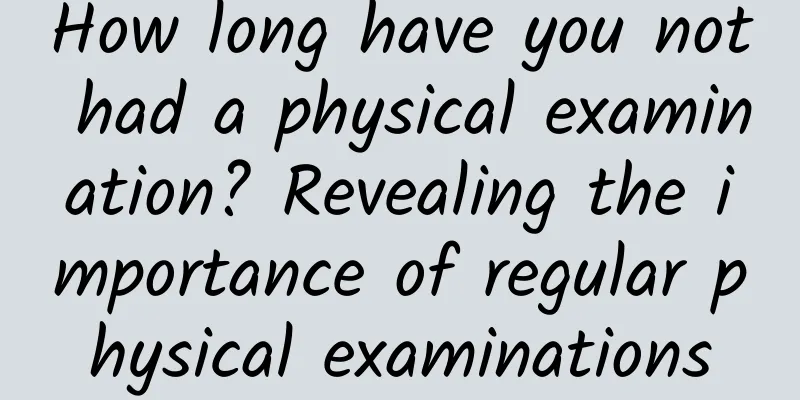How long have you not had a physical examination? Revealing the importance of regular physical examinations

|
In the busy pace of life, we often neglect our most precious asset, our health. Work, family and personal pursuits continue to occupy our time and energy, but we neglect to pay attention to our physical condition. Have you ever thought about how long it has been since you had a comprehensive physical examination? This article will explore the necessity of regular physical examinations and how it can be a guardian angel to maintain health. 1. What is a regular physical examination? Regular physical examinations are comprehensive physical examinations conducted at a certain time period (such as every year, every six months or every quarter) to detect potential health problems at an early stage and to intervene and treat them in a timely manner. Physical examinations usually include blood tests, urine tests, imaging tests (such as X-rays, B-ultrasound, CT, etc.), electrocardiograms, physical examinations, etc. 2. Why do you need regular physical examinations? 1. Detect problems early: Some diseases may not have obvious symptoms in the early stages. Physical examinations can detect and treat them in time, greatly improving the cure rate. 2. Monitor health status: Physical examinations can help individuals understand their health status and conduct long-term monitoring of indicators such as blood pressure, blood sugar, and cholesterol. 3. Disease prevention: Knowing your own health status will help you take appropriate lifestyle and dietary adjustments to prevent the occurrence of diseases. 4. Psychological comfort: Good physical examination results can bring people a sense of security and reduce the anxiety and stress caused by health concerns. 3. Which groups of people are suitable for regular physical examinations? Almost all adults should have regular physical examinations, especially the following: 1. Middle-aged and elderly people: As age increases, the risk of disease gradually increases. 2. Patients with chronic diseases: such as hypertension and diabetes, need to monitor their condition regularly. 3. People with a family history of disease: People with a family history of genetic diseases should pay more attention to relevant examinations. 4. Occupationally exposed population: such as workers who come into contact with hazardous substances. 5. People with bad living habits: such as long-term smoking, drinking, high-fat diet, etc. 4. How often should regular physical examinations be conducted? The frequency of physical examinations should be determined based on individual age, gender, health status, family medical history, etc. Generally speaking, young and healthy adults can have a basic physical examination every two years; middle-aged and elderly people or patients with chronic diseases are recommended to have a comprehensive physical examination at least once a year. 5. What should you pay attention to during regular physical examinations? 1. Choose a regular medical institution: to ensure the accuracy and reliability of the examination results. 2. Make an appointment in advance: avoid waiting in line and save time. 3. Fasting examination: Some examination items such as blood sugar and blood lipids need to be performed on an empty stomach. 4. Comfortable to wear: convenient for changing clothes and conducting various inspections. 5. Bring your past medical records: This will help doctors better understand your historical health status. Conclusion: Health is the foundation of everything, and regular physical examinations are an important means to maintain this foundation. No matter how busy you are, you should take time to care about your physical condition and have a physical examination in time. Remember, prevention is better than cure, and don't wait until your body sends out warning signals before taking action. Now, check your schedule and set aside time for the next physical examination! |
Recommend
Treatment of excessive vaginal discharge after childbirth
Excessive vaginal discharge after giving birth is...
Bloody vaginal discharge after sex
Since men are the dominant party during sexual in...
[Medical Q&A] Why shouldn't patients with liver cirrhosis eat too much pasta and sweets for dinner?
Planner: Chinese Medical Association Reviewer: Ji...
Causes of left ovarian cyst
I believe everyone knows the importance of ovarie...
Why is eyebrow tattooing so expensive? How long does it take for semi-permanent eyebrow tattooing to recover?
Eyebrow tattooing is also a technical job that te...
Sharp and wet baby after normal delivery
Pregnant women with genital warts can also give b...
How to maintain vaginal hygiene
The health of the genitals is extremely important...
Why are women's fingers yellow?
The yellowing of the hands is related to many fac...
Why does the gloxinia flower not bloom? How can the gloxinia flower bloom?
Gloxinia is a common flower plant in life. Becaus...
Can I still keep the baby if I have low progesterone and bleeding?
We all know that we are happy and anxious during ...
If my period comes on the 27th, which day is my ovulation period?
Basically every woman has an ovulation period eve...
How to correctly guide girls to fall in love early
We can't blindly blame our daughters and clas...
What are the correct breast massage methods?
For a woman who pursues fashion, if her breasts a...
What to do if you have abdominal pain after cesarean section
There are two ways for women to give birth, one i...
What are the causes of pain in the right side of the lower abdomen after a meal?
It is inevitable that we have some minor ailments...









